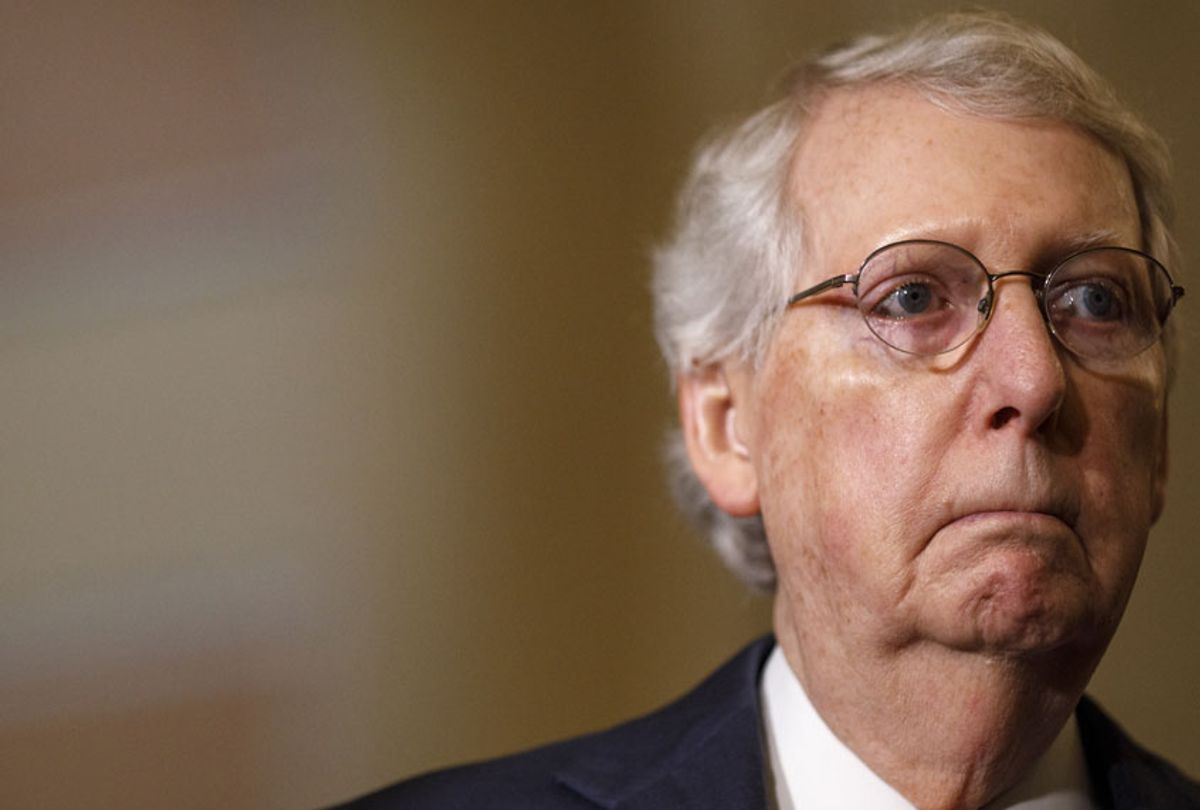A Democratic superdelegate promoting an effort to stop Sen. Bernie Sanders, I-Vt., if he fails to clinch a majority of pledged delegates is a health care lobbyist who has contributed thousands to Republicans.
William Owen, a former Tennessee lawmaker and Democratic National Committee member, was among the superdelegates quoted in a New York Times article revealing an effort among party insiders to block Sanders' path to the nomination if he wins a plurality of pledged delegates but not enough to secure a win on a first ballot.
Owen also owns the lobbying firm Asset & Equity Corporations and donated $8,500 to the Senators Classic Committee, a joint fundraising committee backing Senate Majority Leader Mitch McConnell, R-Ky., and more than a dozen other Republicans like Sen. Lindsey Graham, R-S.C., last year, according to Federal Election Commission filings first flagged by The Intercept. He has also donated to Sen. Mike Rounds, R-S.D., and Sen. Dan Sullivan, R-Alaska, according to the report.
Owen told The Intercept that he also contributes to Democrats, but the outlet found no record that he donated to any congressional or presidential Democratic candidates this cycle despite backing Democrats in the past.
"I am a committed Democrat, but as a lobbyist, there are times when I need to have access to both sides. And the way to get access quite often is to make campaign contributions," he told the outlet. "I'm a registered lobbyist, and I represent clients. And they have interest in front of Congress, and I attend the Senator's Classic, which is a Republican event, each year."
Owen is a registered lobbyist for the health care technology firm Klox Technologies.
He endorsed former Vice President Joe Biden. Politico reported last fall that Owen pushed Biden's team to "develop a second-ballot strategy" for the Democratic National Convention. Owen warned that if Sanders or fellow progressive Sen. Elizabeth Warren, D-Mass, "surges" then "we're in trouble."
With Sanders surging across the country after winning the popular vote in each of the Democratic Party's first three nominating contests, Owen told The Times he hopes former President Barack Obama intervenes to broker a deal, or if he was unwilling, that former first lady Michelle Obama could be nominated as vice president.
"She's the only person I can think of who can unify the party and help us win," he said. "This election is about saving the American experiment as a republic. It's also about saving the world. This is not an ordinary election."
Numerous other Democrats told The Times they planned to try to block Sanders if he did not win a majority, even though the same article quoted President Obama warning that the Democratic Party "shouldn't engage in smoke-filled-room politics" because "those kinds of deals would have prevented him from capturing the nomination when he ran against Hillary Clinton."
Owen previously tried to block the Sanders-backed effort to reduce the role superdelegates play at the convention. "If we don't have a vote, then what good are we?" he complained to Politico in 2018.
But the DNC conceded to Sanders supporters and barred superdelegates from voting on the first ballot. If no candidate wins a majority of delegates, the convention would go to a second ballot for the first time since 1952, allowing the party's 771 superdelegates to potentially swing the nomination to their preferred candidate.
The Intercept previously identified a number of superdelegates who work with health care clients that oppose Sanders' Medicare for All plan and large banks like Goldman Sachs and JP Morgan Chase. A growing number of superdelegates have also gone to work for presidential campaigns opposing Sanders.
Election forecaster FiveThirtyEight predicts that Sanders has a 29% chance to win a majority of delegates, but there is a greater chance (52%) that no candidate does. Every candidate except Sanders vowed to let the convention "work its will" at the Nevada debate earlier this month.
Bloomberg has already quietly started making moves to shore up support from superdelegates, as well as supporters of moderates like Biden and former South Bend Mayor Pete Buttigieg, Politico reported last week. Bloomberg has also hired the vice-chairs of the California and Texas Democratic parties, who are both superdelegates, in an effort to "purchase political support," the watchdog group Campaign Legal Center's Brendan Fisher told The Intercept.
"This does seem to fit a longstanding pattern of Bloomberg using his billions to help generate support among political elites," he told the outlet.
Some Democrats worry that Sanders is a risky candidate in spite of a consistent trend of polls showing that he could actually be the most electable candidate. Democrats who emerged from previous intraparty fights at conventions over the last 70 years went on to lose more than 40 states to Republicans each time.
"We shouldn't be second-guessing voters," Nebraska Democratic Chairwoman Jane Kleeb told The Times. "If that's what our party leaders are going to do, you'll see rebellion not just in the presidential race but in down-ballot races, as well."
Yasmine Taeb, a DNC member from Virginia, argued that Bloomberg poses a much bigger risk than Sanders despite his self-declared claim to electability.
"Why shouldn't D.N.C. members — especially the ones of us who were elected by the grass roots — instead be concerned about a former Republican sexist billionaire who is trying to buy the election? I certainly am," she told The Times. "I'm not concerned, however, with the progressive candidate with the largest grass-roots support across the country to win the nomination, because that's precisely what is needed to defeat Donald Trump."



Shares